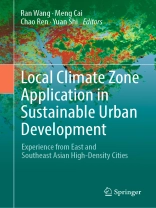The study of local climate zones (LCZ) links urban morphology, land use and land cover types, human activity, and thermal properties, and provides a standard framework for studying urban climatic issues. In recent years, the LCZ scheme attracts more and more attention from climatologists, urban planners, environmental engineers, as well as architects due to its combination of urban climatic scientific research outputs and urban planning and morphology language. Urbanization and higher-density living, an ongoing and continued path of human development, brings various urban climatic and environmental problems. Urban development in a sustainable way is vital for high-density cities to build a comfortable living environment.
This book is the first one presenting systematically the latest LCZ applications by taking Asian high-density cities as an example. Generally, four parts are introduced and discussed in this book. At first, a general background of urbanization and its impacts is introduced, and the basic knowledge of LCZ. The second part introduces the methodology and techniques of LCZ data development. In the third part, various applications of LCZ are demonstrated in practice, including application to urban heat island, land use and land cover analysis, wind environment, energy consumption, thermal comfort studies and so on. Lastly, this book concludes the progress, challenges, limitations, and future work of LCZ-related studies.
The book will be of interest to all that are working on or interested in urban climate, sustainable urban development, and policy-making.
Jadual kandungan
Chapter 1. Urbanization and urban climate in high-density cities.- Chapter 2. Origins and evolution of the Local Climate Zone classification system.- Chapter 3. Current popular methods for LCZ mapping.- Chapter 4. Recent improvements in supervised pixel-based LCZ classification.- Chapter 5. Application of LCZ to urban heat island studies.- Chapter 6. Application of LCZ to land use and land cover studies.- Chapter 7. Application of LCZ to wind environment studies.- Chapter 8. Application of LCZ to energy consumption and carbon emission modeling.- Chapter 9. Application of LCZ to thermal comfort and health-related studies.- Chapter 10. Application of LCZ to time-series urban morphology detection.- Chapter 11. Application of LCZ in mesoscale meteorological model simulations and climate projection.- Chapter 12. Integration of LCZ to planning strategies.- Chapter 13. Conclusions and outlook.
Mengenai Pengarang
Dr. Ran Wang is an Assistant Professor in the College of Economic and Social Development at Nankai University, China. Her research interests mainly include urban climate and sustainable urban design or planning with a focus on the urban thermal environment, land use and land cover change, and urban heat mitigation. She has much experience in modeling and analyzing urban morphology and thermal environments using geospatial analysis, urban climate models and remote sensing techniques. Her research has been published in several journals with high reputations in urban climate and urban planning. She also leads multiple national and international projects on how cities mitigate and adapt to climate change at various scales.
Dr. Meng Cai is a lecturer at the School of Urban Design, Wuhan University. She received her Ph D from the Chinese University of Hong Kong in 2022. Her research interests include urban form and its influence on urban climate. Since 2017, she haspublished over 20 SCI journal articles, which have been cited more than 900 times. Two papers have been rated as highly cited articles in Urban Climate Journal. She won the CUHK Young Scholar Thesis Award, and the first and third prize in the 6th Hong Kong University Student Innovation and Entrepreneurship Competition. She was selected into the Young Scientist Summer Program of the International Institute for Applied Systems Analysis in Austria in 2018.
Dr. Yuan Shi is a Lecturer in Environmental Planning at the University of Liverpool. By conducting interdisciplinary and translational research, he focuses on providing scientific evidence and translating it into practical strategies for urban planners, practitioners and decision-makers for a more resilient built environment. His research shows the interdisciplinary merit and links atmospheric and climate research with sustainable urban planning and urban development. He has published widely in prestigious international journals and has won multiple academic and professional awards with his research. Dr. Shi has been active in several global research communities & networks of urban climate, built environment, and planning. He currently serves on the editorial board of Advances in Climate Change Research, and he is a co-guest editor of the Urban Climate special issue – ‘Decadal Anniversary of the World Urban Database and Access Portal Tool’.
Dr. Chao REN is an Associate Professor in the Faculty of Architecture at the University of Hong Kong. She specializes in applied climatology and climate design, who uses GIS, and spatial modelling methods and remote sensing techniques to study urban environmental performance and develop climate response design strategies and guidelines. Chao’s multi-dimensional, cross-disciplinary research has transferred scientific data into new knowledge to address social needs, enhance policy-making and support evidence-based designs in China, Taiwan, Singapore, The Netherlands and France since 2006.












